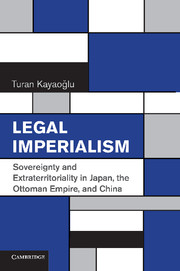Book contents
- Frontmatter
- Contents
- Tables and Figures
- Acknowledgments
- Introduction: Extraterritoriality in British Legal Imperialism
- 1 Positive Law and Sovereignty
- 2 Extraterritoriality and Legal Imperialism
- 3 Japan's Rapid Rise to Sovereignty
- 4 The Ottoman Empire's Elusive Dream of Sovereignty
- 5 China's Struggle for Sovereignty
- Conclusion: American Legal Imperialism – Extraterritoriality Today
- Bibliography
- Index
Introduction: Extraterritoriality in British Legal Imperialism
Published online by Cambridge University Press: 25 May 2010
- Frontmatter
- Contents
- Tables and Figures
- Acknowledgments
- Introduction: Extraterritoriality in British Legal Imperialism
- 1 Positive Law and Sovereignty
- 2 Extraterritoriality and Legal Imperialism
- 3 Japan's Rapid Rise to Sovereignty
- 4 The Ottoman Empire's Elusive Dream of Sovereignty
- 5 China's Struggle for Sovereignty
- Conclusion: American Legal Imperialism – Extraterritoriality Today
- Bibliography
- Index
Summary
Great powers have commonly used law as an imperial tool. During the late nineteenth and early twentieth centuries, Western powers imposed a system known as extraterritoriality in Japan, the Ottoman Empire, and China. Western extraterritorial courts – not local courts – had jurisdiction over Westerners in Japan (1856–1899), the Ottoman Empire/Turkey (1825–1923), and China (1842–1943). During the mid- 1880s, for example, forty-four Western extraterritorial courts operated in Japan's treaty ports. In 1895, thiry-two British courts operated in the Ottoman Empire. Three decades later (circa 1926), twenty-six British, eighteen American, and eighteen French courts dotted China's ports and cities. Even though Japan, the Ottoman Empire/Turkey, and China were not formal colonies of the West, Western states used extraterritorial courts to extend their authority, making these countries, in Mao's term, semicolonies. In so doing, these states limited, and eventually eliminated in collaboration with groups in the local elite, the authority of indigenous legal systems. They replaced them with Western legal categories and practices. This book examines the emergence, function, and abolition of this system of extraterritoriality and offers a new perspective on the development of sovereignty in the nineteenth century. This historical perspective integrates Western colonial expansion and jurisprudence with non-Western political development and legal institutionalization.
Extraterritorial courts had jurisdiction over cases involving Western foreigners. Some cases became notorious examples of Western imperial injustices from the perspective of local people. For example, on October 24, 1886, a storm caught the British freighter Normantonoff the coast of Oshima Island, Japan, whereupon the freighter hit a rock and sank. All of the Japanese passengers drowned, but the British officers and crew took the two lifeboats and survived.
- Type
- Chapter
- Information
- Legal ImperialismSovereignty and Extraterritoriality in Japan, the Ottoman Empire, and China, pp. 1 - 16Publisher: Cambridge University PressPrint publication year: 2010
- 1
- Cited by



